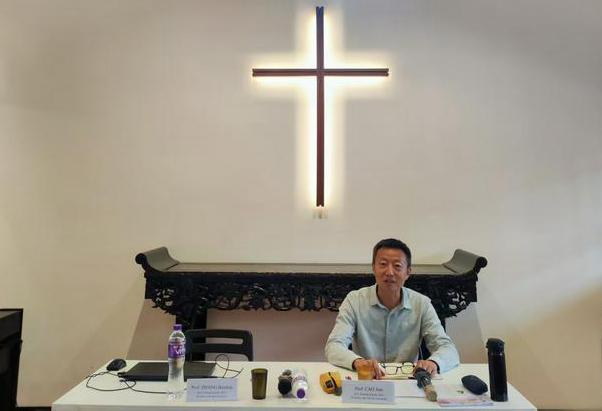On April 17, during a study visit by faculty and students from the Divinity School of Chung Chi College, the Chinese University of Hong Kong, Professor Cao Jian of Sun Yat-sen University delivered a lecture on the connection between Hebrew Bible Studies and Chinese academia at the Institute of Sino-Christian Studies (ISCS), Tao Fong Shan (TFS).
Professor Cao, a specialist in Hebrew Bible and Judaic studies, began by acknowledging his longstanding collaboration with ISCS, including editorial work for academic journals and joint lecture initiatives. His presentation offered a critical assessment of the development, current state, and future prospects of Hebrew Bible scholarship within China's academic landscape.
To illustrate the current academic environment, Prof. Cao cited three recent events involving Sun Yat-sen University's Philosophy Department: a lecture by Professor Markus Bockmuehl from Oxford University on the concept of evil in ancient Judaism and early Christianity, another lecture by Professor Frank Hofmann from the University of Göttingen on Immanuel Kant's philosophical critique of Judaism, and his own lecture on Post-Zionist history and narrative. Prof. Cao noted his disagreement with the speaker's interpretation in the second lecture, suggesting Kant's critique shifted the focus from religious to ethnic aspects, potentially laying the groundwork for later racial theories.
Prof. Cao suggested these examples demonstrate several points: the ongoing collaboration between institutions like Sun Yat-sen University and ISCS; the expansion of Bible-related studies into fields like philosophy, history, and political narrative; and the gradual resumption of international academic exchange following disruptions.
The core of the presentation addressed the question of how to understand the current state and future trajectory of Hebrew Bible studies in China. The professor argued that its present condition must be understood by examining its past, particularly since the reform and opening up period beginning in the late 1970s and the early 1980s. In the West, he described it as a more organic process growing out of the surrounding culture over centuries. In China, he characterized the Bible and Christianity as elements introduced into a pre-existing civilization, necessitating a process of engagement with local culture (sinicization) from the outset.
Prof. Cao observed that the resurgence of Bible studies in China during the 1980s coincided with the rise of postmodernism, deconstruction, and related literary and historical theories (like New Historicism) in Western academia. This confluence influenced the initial shape of the field in China. Early research often focused on "biblical literature," employing narrative analysis and literary appreciation approaches. Many scholars entering the field during this period came from disciplines like Chinese literature or foreign languages, often without specialized training in biblical languages or traditional critical methodologies.
Consequently, research during the 1980s, the 1990s, and into the 2000s frequently utilized theoretical frameworks prevalent at the time, such as feminist criticism, psychoanalysis, and postcolonial theory (mentioning Edward Said and Chinese scholars applying these lenses). Research topics often reflected postmodern interests in decentralization, multiplicity, and marginalized perspectives, focusing on aspects like biblical clothing, music, female figures, or grassroots elements, rather than solely on traditional theological or historical-critical themes. This approach sometimes mirrored trends in microhistory or "New Cultural History."
While acknowledging the diversity this brought, Prof. Cao also pointed to a potential drawback: a blurring of disciplinary boundaries and a perceived lack of methodological rigor compared to traditional Western biblical scholarship. He contrasted this with the emphasis in Western academic training on foundational skills, particularly extensive language acquisition (Hebrew, Greek, Aramaic, Ugaritic, etc.) and mastery of historical-critical methods (mentioning Spinoza, Wellhausen's documentary hypothesis, etc.). He recounted an anecdote suggesting Western scholars might dedicate decades to language and textual study before producing major original work, highlighting a deep grounding in foundational methods that persists even alongside newer approaches.
Prof. Cao identified positive developments in recent years. A younger generation of Chinese scholars have increasing opportunities for rigorous training at international institutions and universities are also hiring scholars with overseas doctorates and specialized training. The current generation of scholars, many with their own overseas study experience, are working to provide better foundational training for their students, aiming to build a more solid base for the field's future.
However, Prof. Cao also outlined persistent challenges. He described the field as lacking systematic development, with relatively few dedicated research centers and a small number of specialists often concentrated in specific universities or subfields. He also addressed the significant role played by overseas institutions, often with Christian affiliations, in supporting the development of Bible studies in China through funding, resources, and training programs. While acknowledging the positive contributions, he noted this can introduce a "Christian bias," potentially leading to the Hebrew Bible being interpreted primarily through the lens of later Christian tradition. He stressed the importance of studying the Hebrew Bible in its original ancient Israelite and Ancient Near Eastern context, requiring engagement with related fields and texts (e.g., Ugaritic studies).
Furthermore, he discussed the marginal status of Hebrew Bible and Judaic studies within the Chinese academic structure. These fields are often situated within religious studies programs (frequently under Philosophy departments) and may be considered peripheral compared to the study of Chinese religions or Buddhism. This can lead to difficulties in securing funding, academic positions, and attracting sufficient numbers of qualified students. He mentioned the dilemma of maintaining rigorous entry standards versus the practical need to recruit students to sustain programs.
In conclusion, Prof. Cao suggested that despite the challenges and the field's marginal position, the way forward involves dedicated, foundational academic work by scholars in teaching and research. He expressed a belief that consistent effort in building this foundation will be beneficial in the long run, while also reiterating the need for clearer disciplinary standards and methodological rigor within the field in China.












